
Early hip-hop! Leftover classic rock! Italian sex disco! Racist tomfoolery! And the luckiest bar band in the Midwest! All in our continuing crawl through Disc One of this seven-disc set!
#6 Kurtis Blow, ”The Breaks (part 1)”
#87 Billboard Hot 100, #4 Billboard R&B chart, #9 Billboard Dance chart.
Dw. Dunphy – I didn’t have contact with a lot of rap at that stage, and what I did have was primarily Grandmaster Flash and Grandmaster Melle Mel. All of which is to say that “classic” rap sounds absolutely nothing like what it eventually became. This song, while fun on its own merits, also kind of sounds like every white male adult from 1981-1987 who said “I can also do that rapping thing too! I’m your uncle and I’m here to say…!”
David Lifton — I actually heard an attempt like that at white rapping fairly recently. No, it wasn’t by me.
Chris Holmes – If there’s one area where my musical knowledge is woefully inadequate it’s rap/hip hop, especially the early stuff. That said: This sounds like it’s from a completely different world than what came later in the ’80s and ’90s. It sounds clunky and awkward even to my ears, but there’s an undeniable fun and charm to it. And hey, props to Kurtis for using an original instrumental track on this song.
Jack Feerick — Yeah, it’s disconcerting going back and listening to old-school rap after a steady diet of the newer stuff. The state of the art has simply moved so far onwards, and the genre has come to place tremendous value on technique.
Eminem, Jay-Z, even Kanye — these guys are virtuosos on a par with Yngwie Malmsteen; blindingly fast, their riffs intricate with internal rhymes, extended metaphors and complex enjambment. Kurtis is like (let’s say) Ike Turner, by comparison; plenty of bravura and attitude and imagination, but without much in the way of chops, per se.
The difference is that while there are still plenty of guitar players doing great things in the Ike Turner mode — getting a lot of mileage out of a fairly basic skillset — there’s really nobody still doing conversationally-paced A-B-A-B rhyming in hip-hop anymore. The shredders have driven everyone else out.
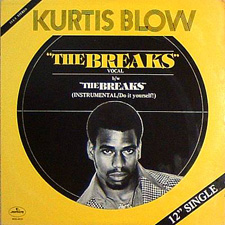 Mike Heyliger – “The Breaks” came slightly before Flash & the Furious Five, so I find it odd that anyone would’ve heard them first. At any rate, this is the first rap record I remember having in the house as a kid. I was probably more intrigued by the groove of the band (and the taxicab yellow cover of the 12″) than I was by the lyrics. Still a pretty solid song (when condensed into its tighter single version) and definitely relatable. Poor folks ain’t never gonna go out of style.
Mike Heyliger – “The Breaks” came slightly before Flash & the Furious Five, so I find it odd that anyone would’ve heard them first. At any rate, this is the first rap record I remember having in the house as a kid. I was probably more intrigued by the groove of the band (and the taxicab yellow cover of the 12″) than I was by the lyrics. Still a pretty solid song (when condensed into its tighter single version) and definitely relatable. Poor folks ain’t never gonna go out of style.
Rob Smith – I understand I should like this. For me, a lot of old-school hip-hop is a case of “you had to be there.” I get the cultural impact, but it doesn’t move me.
Dan Wiencek – I’d never heard this one. No memories of it at all. (Probably because it barely cracked the Hot 100— our local B96 wouldn’t have bothered playing this when it was busy pimping “Another Brick in the Wall” once an hour.) It has an unpretentious charm, doesn’t it? Anyway, I’m pretty sure I’d rather listen to this than “Rapture.”
Michael Parr – Kurtis Blow might not have sampled Chic, but he might as well have; the breakdowns are straight out of Nile Rodgers and Bernard Edwards playbook. I recall hearing this after learning every word to Grandmaster Flash and the Furious Five’s “The Message.” The growth of Hip-Hop in those early years could be measured in leaps and bounds.
Jon Cummings – Shockingly, this song never registered in rural Southwest Virginia during the early ’80s — I didn’t hear it until after I’d heard a lot of Run-DMC and Grandmaster Flash. I must admit that I miss the early hip-hop that required nothing more than a nice hook, some MC braggadocio and maybe a little half-assed (or whole-assed, in the case of the Furious Five) social consciousness. And now I sound very old.
Brian Boone – The best and most lasting example of rap’s early, awkward, uncomplicated years, but which is somehow the only rap with which millions of goofy dads from the suburbs are familiar. I can’t tell this apart from “My name is Dad and I’m here to say / I’ll pack your lunch in a major way.”
#7 Pete Townshend, ”Let My Love Open the Door”
U.S. Top Ten.
Dunphy – I like Pete a lot and have a soft spot for this song, but I feel it comes a little too close to “You Better You Bet” at times. The slowed-down version Townshend provided for the Grosse Point Blank soundtrack is the better version.
Lifton – This came before “You Better You Bet,” so it’s the other way around. I love the remix, too, but it also removes half of the bridge, which is my favorite part of the original. “Release yourself from misery/There’s only one thing gonna set you free.” The real stroke of genius is in the chords, how it goes C-G-F in the verse but switches the relative minor Am-G-F for the chorus, so when the chorus ends and it goes back to the C it brings so much lightness into the track.
Feerick – It feels slight, but once I learned that Pete was writing this from the perspective of a loving God addressing his creation, I think it may be the most profound song ever. That being said, I too have come to vastly prefer the ”E-Cola” remix.
Boone — That remix is as sweet and poignant as Townshend’s vocals aim to be, and so late and unexpected after the original. OMG, did Pete Townshend invent the remix?!?
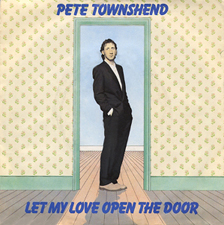 Wiencek – As a lad, this one fell in the “Songs My Dad Likes” bin, along with Phil Collins and Chicago, so it took a bit of time to warm up to. There’s not much to say other than that it’s a really good, unpretentious pop song. It’s held up remarkably well over the years, and deservedly so.
Wiencek – As a lad, this one fell in the “Songs My Dad Likes” bin, along with Phil Collins and Chicago, so it took a bit of time to warm up to. There’s not much to say other than that it’s a really good, unpretentious pop song. It’s held up remarkably well over the years, and deservedly so.
Heyliger – I don’t think I heard “Let My Love Open the Door” until the late Nineties, when it was used in commercials for “Friends.” I’m not the hugest Who fan, and I’m reasonably unfamiliar with Townshend’s solo work. That said, this is a very cool, snappy pop song. It’s aged really well.
Feerick – Better than Pete himself, anyway. Yiiiiiiikes!
Smith – The Who was winding down at this point, and you had to wonder whether Townshend was saving his best material for his solo records (It’s Hard, “Eminence Front” notwithstanding, likely confirms this, once and for all). Still, I think this would’ve sounded bloody awesome with Daltrey singing it, and Pete windmilling in the background. It’s a great song as it is, but in the back of my mind, I still hear Roger singing it.
Lifton – Townshend has admitted that he was using the best songs for his solo records, but I don’t know if Roger could have captured the more spiritual aspects of the song. A good comparison is “Don’t Let Go The Coat,” which was based on Meher Baba’s teachings. I always preferred Pete’s demo from Another Scoop to the Who’s version on Face Dances because Pete’s voice was better suited to the lyrics.
Parr – This, and “You Better You Bet,” are my two favorite Townshend compositions.
Jon Cummings – I believe I hear this song on the radio now more than I did when it was a hit – perhaps because I listen to satellite. But I’m never sorry to hear it. This is gonna sound loony, but I would swear that the most moving moment in a rom-com during the current millennium is widower Dan (Steve Carell) taking the final verse from his idiot brother (Dane Cook) during a family talent show in “Dan in Real Life.” Not that there’s a lot of competition for that particular honor – or a lot of rom-coms in this millennium that weren’t rendered unwatchable by the presence of Katherine Heigl. But I digress.
Holmes – Not even its appropriation as a go-to song for rom-coms can spoil this for me. But the real killer track from Empty Glass is the one that precedes this, “And I Moved.”
Lifton – Which was originally written for Bette Midler, but he decided to keep it without changing the gender.
David Medsker – Completely agree about “And I Moved.” It reminds me of mid-period Roxy Music. Empty Glass is just killer from start to finish.
#8 Blondie, ”Call Me”
#1 in the U.S., Canada, and the UK, and Top Ten just about everywhere else. Written with, and produced by, Giorgio Moroder.
Cummings – God I hate this song. Shrieking, shrieking, shrieking. Turn it off!
Holmes – I like this enough, but I suppose I should admit here that I have never bought into all the Blondie love out there.
Heyliger – As far as Blondie’s attempts at dance music go: Rapture > Heart of Glass > Call Me. Actually, I love all three songs, and Giorgio Moroder had the rock/disco thing down pat with songs like this and “Hot Stuff.”
Smith – I remember hearing this on the radio more or less constantly during its chart run. It’s just so propulsive, so insistent, and Debbie Harry such the definition of cool … it’s my favorite song of theirs, and it makes me kind of sad to think they followed this up with The Hunter, which is utter dreck.
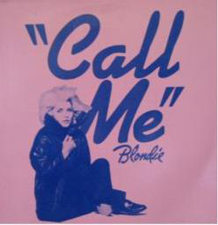 Feerick – The presence of Giorgio Moroder here seems like a good cue to talk a little more about the globalization of pop. The German influence was all over prog and psych and electronica; the Italians, meanwhile, were gearing up for innovations in dance music — disco, and the beginnings of house. Moroder accomplished great things by setting a metronomic pulse against sexy vocals. It worked spectacularly well with Donna Summer. With Blondie, though, it’s a different kettle of fish. Debbie Harry’s not sexy in the same mode as Donna; she’s a shouter, all brass and peroxide. She’s never seductive, exactly — because for her, it’s not about the expression of desire, it’s about control. When she coos, it’s transparently fake, and she doesn’t care if you know it’s fake, so long as it works on you — because it’s being in charge that really gets her off.
Feerick – The presence of Giorgio Moroder here seems like a good cue to talk a little more about the globalization of pop. The German influence was all over prog and psych and electronica; the Italians, meanwhile, were gearing up for innovations in dance music — disco, and the beginnings of house. Moroder accomplished great things by setting a metronomic pulse against sexy vocals. It worked spectacularly well with Donna Summer. With Blondie, though, it’s a different kettle of fish. Debbie Harry’s not sexy in the same mode as Donna; she’s a shouter, all brass and peroxide. She’s never seductive, exactly — because for her, it’s not about the expression of desire, it’s about control. When she coos, it’s transparently fake, and she doesn’t care if you know it’s fake, so long as it works on you — because it’s being in charge that really gets her off.
Dunphy – Undeniably Moroder, but that’s okay. Debby Harry was, by now, as far from punk as one gets and yet I can’t bring myself to dislike this song. It’s as slick as a patch of ice, but it’s just as cool.
Lifton – My second favorite Clem Burke performance, after “Dreaming.”
Boone – This sure glamorizes being a male prostitute. Let me tell you, it’s not Richard Gere in American Gigolo glamorous, or even Richard Gere in Pretty Woman sweet. Wow, Richard Gere is really into hookers. However, this song bridges disco and post-disco so nicely. That screeching keyboard solo remains as foxy as Debbie Harry’s dark roots (which is good, I’m not sure if that was clear).
Wiencek – Speak of the devil. Disco makes its last, croaking stand, skewered with arrows, determined to keep fighting and not realizing it’s basically dead. (Well, for a time at least.) You can close your eyes and almost picture Steve Rubell being led away in handcuffs, wondering where and how it all went so wrong. At any rate, dying genre or not, I’m a sucker for this kind of heavy, driving beat, even if I could barely make out what she was singing. And the modulation in the bridge — very slick. It’s interesting to look ahead a bit to the next dance track awaiting our review: “Genius of Love.” What a difference a year will make.
#9 REO Speedwagon, ”Keep On Loving You”
#1 U.S. Single went double platinum.
Boone – His love is so powerful he doesn’t even need to take sleep breaks, you guys.
Heyliger – I have a soft spot for “Keep On Lovin’ You.” No idea why. Cronin’s phrasing is going to bother me foreverrrrrrr, though.
Feerick — Yeah, I was amazed to discover the official title is “Loving,” and not “Lovin’.” because he drops those G’s like they’re hot.
And oh, that video! Kevin Cronin’s acting debut! (Don’t quit you day job, son.)
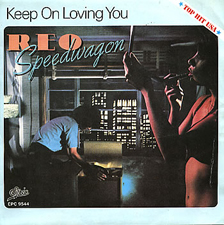 Wiencek – Why, I do believe it’s our first power ballad! Having loved REO Speedwagon at the time (I was nine for chrissakes), then loathed them for most of my adulthood, I lately find myself in a forgiving mood. I can handle this. The words are stupid — “You played dead / but you never bled”; the hell? — but stupid words are only a venial sin, not a mortal one. Cronin’s phrasing may have been shit, but he has the kind of voice that seems meant to come out of a car radio. And the guitar solo — more of a long fill really — gives it a bit of a lift. I get why this was a hit, even for people who weren’t nine.
Wiencek – Why, I do believe it’s our first power ballad! Having loved REO Speedwagon at the time (I was nine for chrissakes), then loathed them for most of my adulthood, I lately find myself in a forgiving mood. I can handle this. The words are stupid — “You played dead / but you never bled”; the hell? — but stupid words are only a venial sin, not a mortal one. Cronin’s phrasing may have been shit, but he has the kind of voice that seems meant to come out of a car radio. And the guitar solo — more of a long fill really — gives it a bit of a lift. I get why this was a hit, even for people who weren’t nine.
Holmes – Was the phrase “power ballad” even around in 1980? Blech.
Cummings – I like to think of this song, and the Hi Infidelity album generally, as a triumph of sheer, WTF record-label hubris. “Let’s see what happens if we actually promote this one,” said somebody at Epic, and lo! a mega-seller was born. That’s probably not what happened – somebody will come along and show me an old invoice for millions of dollars in promo fees racked up on behalf of You Can Tune a Piano, But You Can’t Tuna Fish — but I’ll stick to my theory regardless of facts, because how else can one explain why “Keep On Loving You” charted 55 points higher than “Time For Me To Fly”? I mean, seriously — it’s a decent power ballad and all, but come ON!
Smith – No one expected REO to ever have a Number One record — not even REO. They were road dogs, making their living by coming to your town, setting up their equipment, burning down your local hockey arena, defiling your women, getting back on their tourbus, and repeating the process within 24 hours, 300 miles away. “Keep on Loving You” was a fluke, a mistake, its success probably tied to payola, but who gives a shit? It’s great. This and “Waiting for a Girl Like You” ushered in the Eighties power ballad thing. Thank God they did.
Feerick – Said it before, I’ll say it again; these guys were not the best band in Chicago, not by a long shot, but by God I do believe they were the luckiest.
Dunphy – This song would be a thousand times betterrrrrrrrah without those annoying Crrrrroninisms.
Lifton – This song would be a thousand times better if it didn’t exist.
#10 The Vapors, ”Turning Japanese”
#36 Billboard Hot 100; #3 in the UK, top of the charts in Australia.
Smith – Ugh.
Dunphy – I’ve heard that the song’s title is a euphemism for… something else. I don’t believe it is true, and wish it wasn’t so damned catchy because, in either view, it is not culturally sophisticated.
Annie Zaleski – ”Turning Japanese” was widely considered to be a euphemism for masturbation. This great VH1 clip debunks that, though.
Also, Rob Kemp from the band owns that YouTube channel — he has a demo of the song up.
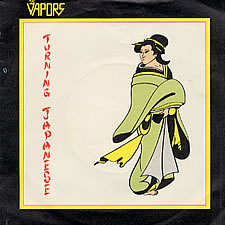 Feerick – Yeah, I’ve heard the singer swear up and down that this song is not a piece of vaguely racist guff about making the jerk-off face — that it’s about an identity crisis, about the feeling of finding yourself turning into a person you don’t recognize, and I’ve heard him say he might as well have called it ”Turning Portuguese” — but let’s look at the internal evidence, shall we? Narrator is lonely, either separated from a girl or pining for her from afar; he’s fixated on a photograph, which he ”often kiss[es] when there’s no one else around,” and wishes that he had photographs of a more intimate nature. Nope, can’t imagine why anyone would think this one’s about masturbation.
Feerick – Yeah, I’ve heard the singer swear up and down that this song is not a piece of vaguely racist guff about making the jerk-off face — that it’s about an identity crisis, about the feeling of finding yourself turning into a person you don’t recognize, and I’ve heard him say he might as well have called it ”Turning Portuguese” — but let’s look at the internal evidence, shall we? Narrator is lonely, either separated from a girl or pining for her from afar; he’s fixated on a photograph, which he ”often kiss[es] when there’s no one else around,” and wishes that he had photographs of a more intimate nature. Nope, can’t imagine why anyone would think this one’s about masturbation.
(Also, if you pull my other leg, it plays ”Jingle Bells.” No, really!)
Lifton – Whether it’s about masturbation or not, it’s about masturbation.
Feerick – Anyway: Heard this on the radio tother night in the presence of my teenage daughter, and what once was mildly amusing now seemed embarrassing — like when you’re watching a DVD with your parents over Thanksgiving and all of a sudden the lead actress takes her top off.
Dunphy – Accursed home movies.
Heyliger – How does “turning Japanese” correlate to masturbation? Unless there’s some technique that I’m not aware of.
Feerick – I don’t even want to…
Okay, okay, okay: if you are prone to HIIIIII-LARIOUS racist “humor,” you can make a SCREAMINGLY FUNNY stereotypical Japanese face— you know, slitty-eyed and bucktoothed — by biting your lip and squinting. And when else do you bite your lip and squint? That’s right. OH SNAP! WHAT A HOOT, right?
Right?
Christ, I need a shower now.
Boone – While time has rendered this basically a vaguely racist novelty song, it’s really perfect New Wave. The drums is this are, pun intended, seminal.
Cummings – A centerpiece of the finest party mixtape I ever made, and my favorite song at the time it was released. Wasn’t it everybody’s? Forget about the subject matter — nobody masturbated more than I did in 1980, so it’s moot point anyway – and let’s get to the real question: Is it “cyclone ranger” or “psyched Lone Ranger”? “The ”Cyclone Ranger” is a western from the mid-’30s about former cattle rustlers who get no trust when they try to go straight. Clearly Fenton, from his perch in the UK, was a fan of old westerns, but was he that big a fan? And if not, WTF is a “psyched Lone Ranger”? And one more mystery — how did this manage to chart at only #36 in the US?
Wiencek – I’m with Jon — how did this exemplary one-hit wonder only get to #36? When I was a kid, this was the closest thing I knew of to an underground record — you never heard it on the radio, and MTV only rarely played the video. But it’s a great slice of power pop, with a great riff — not the stereotypical “oriental” bit at the top, but that little chugging thing between repetitions in the chorus — and a cool, Townshend-esque solo.
Holmes – I’m sure no band wants to be remembered as a one-hit wonder, but there are worse fates than to be associated with this track. A fun, albeit inconsequential, nugget from New Wave’s golden age.





Comments